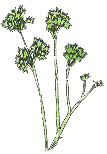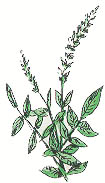THE LYMPHATIC SYSTEM
The lymphatic system plays a central role in building immune response. It enables the body to rid itself of bacteria and viruses, and produces lymphocytes, powerful fighter cells. It removes toxins that originated in the environment and toxic waste products that our cells produce as part of their metabolism. If these toxins are not removed, they can build up in the blood and eventually poison us.
The lymphatic system consists of the lymphoid organs, which are spread throughout the body. These are the bone marrow, thymus, lymphatic vessels, lymph nodes, and spleen, as well as the adenoids and tonsils. The lymphatic system and lymphoid organs get their name because they are concerned with the growth, development, and deployment of lymphocytes, white blood cells that are key to the immune system.
 Bone marrow
Bone marrow
Bone marrow is the soft tissue in the center of all the bones in the body. It produces both red and white blood cells. The white blood cells created in bone marrow can be further divided into two types: lymphocytes and phagocytes. These two types of white blood cells are the immune system's front-line fighters. Bone marrow also houses the lymphocytes known as B cells until they reach maturity. B cells fight disease by secreting antibodies into the body fluid. These antibodies fight bacteria and viruses.
ThymusThe thymus is located near the top of the lungs and behind the breastbone. It is a key to immune response. Lymphocytes known as T cells get their name from the thymus because after bone marrow produces them, they are passed on to the thymus, which fosters their development. T cells both regulate immune response and attack infected or malignant body cells. The thymus also acts as the central clearinghouse of immune response, passing lymphocytes into the lymphatic system, which transports them to where they are needed.
transports them to where they are needed.
The lymphatic vessels are the arteries that carry white blood cells throughout the body. White cells also can travel in the blood, but the lymphatic vessels are better equipped to transport the waste materials that the white blood cells pick up. Like small creeks that empty into larger and larger rivers, the lymphatic vessels feed into larger and larger channels. At the base of the neck, they merge and their contents are discharged into the bloodstream, which carries the wastes to the kidney for processing and removal from the body.
Lymph nodes and spleenLymph nodes are small, bean-shaped stopping points spread throughout the body. They are wait stations for white blood cells to congregate until they are needed to fight an invading pathogen. Clumps of lymphoid tissue are found in most parts of the body, especially in the linings of the digestive tract and the airways and lungs all the places where pathogens can enter the body. These lymphatic tissues include the tonsils, adenoids, and the appendix. The spleen also contains special compartments where white blood cells gather and work.
All told, the lymphatic system is composed of literally hundreds of miles of lymphatic vessels and nodes. It is key to the elimination of waste products generated throughout the body. Dead cells, one of the major components of this waste, collect in the lymph nodes, where they are passed on to the bloodstream, which, in turn, delivers them to the lungs, kidneys, colon, and skin for elimination from the body. Together, all of the organs that make up the lymphatic system work to protect us from disease and illness.
 Helping the lymphatic system
Helping the lymphatic system
Throughout the ages, those interested in health have discovered a number of natural ways to help maintain a healthy lymphatic system.
The first place to start is by drinking plenty of water. Making sure the body is well-hydrated will help the lymphatic system do its job of flushing toxins and waste from the body. Try to drink eight to ten glasses of pure water per day.
Bouncing on a rebounder a mini-trampoline for five to 15 minutes per day can help drain the lymphatic system. Brushing your skin is also helpful. This also stimulates the lymphatic system to discharge toxins. After rising in the morning, use a brush with stiff bristles and brush the skin.
HerbsThere are a number of herbs that may benefit the lymphatic system.
Barberry root barkAffects: liver, spleen, digestive tract, blood
Barberry may help with an enlarged spleen. One constituent, berberine, may have antibiotic properties. According to Michael Castleman in The Healing Herbs, barberry may also stimulate the immune system and may activate macrophages. Other sources state that it helps bile flow.
Boldo leavesAffects: liver, stomach
Boldo is an evergreen shrub that grows in the Andes Mountains. It is said to help with gallbladder problems. One constituent, ascaridole, is said to function as a vermifuge, which expels intestinal worms.
Buckthorn barkAffects: liver, gallbladder, intestines, blood
Buckthorn is a depurative, which promotes the excretion and removal of waste material. It is also a mild laxative and is said to aid bile production.
laxative and is said to aid bile production.
Affects: blood, kidneys, liver
Burdock root has a long history as a detoxifier. In Herbal Medications, A.W. and L.R. Priest note that burdock can be used & to remove accumulated waste products. It is also known to help with lymphatic congestion.
Cascara sagrada Affects: colon, stomach, liver, gallbladder, pancreasCascara sagrada, although best-known as a mild laxative, also is a general tonic that promotes well-being and all body systems.
ChickweedAffects: blood, liver, kidneys, bladder
Chickweed boasts many folk remedies, but none have been substantiated by science. It is said to be good for the blood and joints.
Dandelion rootAffects: liver, kidneys, gallbladder, stomach, pancreas, intestines, blood
 Dandelion has a distinguished history as a detoxifier. Pizzorno and Murray, in A Textbook of Natural Medicine, call it a fine remedy for a toxic liver. The Ayurvedic physician Vasant Lad and David Frawley, in The Yoga of Herbs, say dandelion is also good for the lymph glands, and Santillo, in Natural Healing with Herbs, classifies it as a lymphatic, which cleanses the lymphatic system.
Dandelion has a distinguished history as a detoxifier. Pizzorno and Murray, in A Textbook of Natural Medicine, call it a fine remedy for a toxic liver. The Ayurvedic physician Vasant Lad and David Frawley, in The Yoga of Herbs, say dandelion is also good for the lymph glands, and Santillo, in Natural Healing with Herbs, classifies it as a lymphatic, which cleanses the lymphatic system.
Affects: blood, lymph, kidneys
Echinacea was used by Native Americans, and today it is recognized as an aid to the immune system. Echinacea contains echinacoside, a natural antibiotic, which is probably responsible for antibiotic properties. Studies in Europe have shown that echinacea increases production of T cells. Santillo classifies it as a lymphatic, which cleanses the lymphatic system.
KelpAffects: thyroid, nerves, brain, kidneys, bladder
Kelp is a very nutritious food, containing many vitamins and minerals. Sodium alginate, a constituent of kelp, binds to heavy metals in the gastrointestinal tract and forms an insoluble gel-like salt that is excreted in the feces. Kelp also appears to help the colon and intestinal flora and may help with lymph node enlargement.
Licorice rootAffects: lungs, stomach, intestines, spleen, liver
Licorice is well-known as a powerful herb. According to a report in Microbiology and Immunology, licorice may stimulate cell production of interferon. Asian studies and studies published in the Plant Medica (1984, 50) have shown it to be helpful for the liver.
ParsleyAffects: kidneys, bladder, stomach, liver, gallbladder
From the 1850s to 1926, parsley was recognized by the United States Pharmacopoeia as a laxative and a diuretic. Today, it is more commonly used as a breath freshener.
Sarsaparilla
Affects: blood, skin, circulation, intestines
Sarsaparilla, according to Joseph Pizzorno and Michael Murray in A Textbook of Natural Medicine, has been used in Europe since the sixteenth century as a blood purifier. Sarsaprilla is also said to bind to endotoxins and escort them out of the body. If endotoxins remain in the body they can contribute to a number of health-related problems.
|| back to top || return to articles list ||

